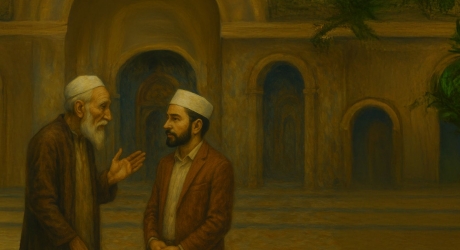It is not uncommon for feelings to run so high over minor differences that what starts out as a tepid argument soon develops into a raging conflict. Two people, who at the outset had only been slightly at odds with each other, turn into fiery-tempered opponents and it is but a short step from there to becoming deadly enemies. They descend to the level of hurting and humiliating each other and, in extreme cases, do everything in their power to silence their antagonists forever. Both engage in equally destructive activities, but never come to realize the heinousness of their behaviour until the dire moment when death comes, at the appointed hour, to claim one or the other at the behest of the Almighty. It is only then that the conflict ends, by which time it is too late to have regrets or to attempt to make reparations. Each longed for the premature death of his adversary, but the lives of both could have remained untainted by strife if even one of them had given some prior thought to his own inevitable end.
If each were to pause at some point – well before such extremes had been reached–just to ponder upon the inevitability of death, not only for others, but more particularly for himself, all quarrelling would at once be seen as sheer madness. Any further argument would be accepted as futile, and all wrangling and dastardly manoeuvring would cease. Death is a daily occurrence, but because we think of death as something which happens to other people–never to ourselves, we learn no lesson from it. Should we even for one brief moment, think of death as an eventuality which could overtake us at any point in time, we would find that this very thought would put an end to disputes and the ensuing fatal enmity. If death puts an end to man’s existence, the thought of death ought surely to put an end to man’s wickedness. But no one thinks of death in this realistic way and, in consequence, the death of another does nothing to root out the evil in the human beings who survive.
Prophet Mohammad asked us to keep death ever in mind, as this would raze to the ground the edifice of our ill-conceived pleasures. In this way, one who expected to derive great pleasure from the downfall of an adversary would cease to gloat over his possible destruction the very moment the thought of his own demise entered his head. His feelings of vengefulness would disappear, and he would even forget that he had an enemy whom he had been planning to ruin.
A man who is perpetually aware of being a target for death, will harbour no inclinations to harm anyone else. The man, on the other hand, who stands on the brink of the grave, without reminding himself constantly of this grim reality, will continue to be preoccupied with the destruction of others. What arrant foolishness this is when God may will, at any point in time, that he be forthwith obliterated!
Source: Al-Risala, June 1988









